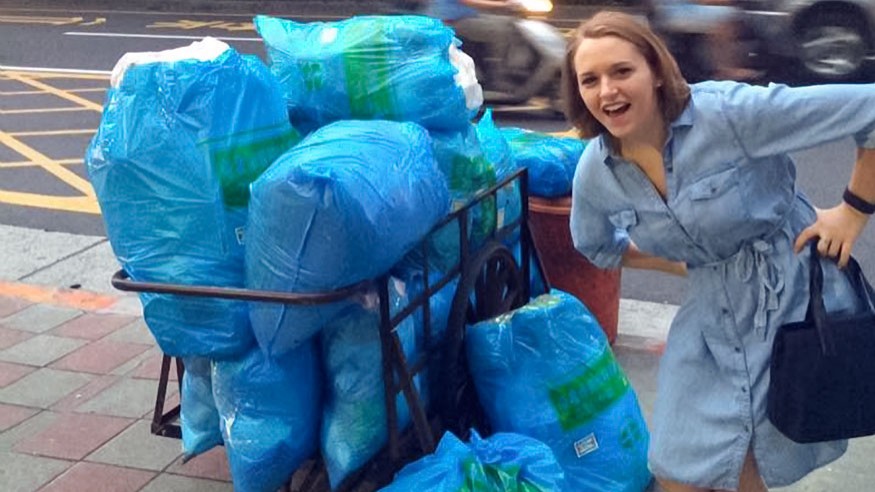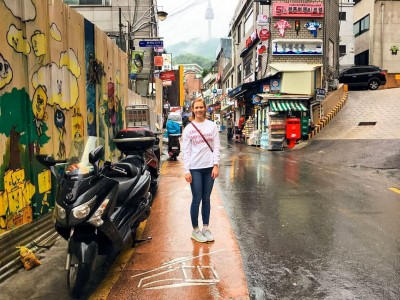
Exploring Waste Management in East Asia
Luce Grant Supports OWU Student-Faculty Trips to Taiwan, South Korea, Japan
“Convenience is overrated,” declares Catie Kocian ’18, “especially when it comes to the environment and waste.”
Kocian is one of 13 Ohio Wesleyan University students and three faculty members who traveled to East Asia over the summer to study how Taiwan, South Korea, and Japan think about and deal with waste in their respective cultures.
The travelers shared their findings during a recent campus presentation. Their experiences, all part of The OWU Connection, were supported by a Luce Initiative on Asian Studies and the Environment (LIASE) Exploration Grant awarded to the University by The Henry Luce Foundation.
‘Trash Matters’ in Taiwan

Kocian and James Ormerod ’17 traveled to Taiwan with assistant professor Ching-Hsuan Wu, who says Taiwan is about a third the size of Ohio but with more than twice as many people (24 million vs. 11 million).
“When you have so many people, trash matters,” says Wu, who is now the academic director of the Chinese Flagship Program at Western Kentucky University.
It matters so much, in fact, that Taiwan enforces a policy of “no trash on the ground.” Citizens stand outside their homes each week, garbage bags in hand, waiting for a collection truck to arrive. Residents know when the vehicle is near because it plays music. “It reminded me of an ice cream truck,” Ormerod says. “It has that whimsical feel to it.”
The Taiwan travelers also visited National Taiwan University and the Bali Incineration Plant, and saw the impact of a society with virtually no public trashcans. Littering is rare because of hefty fines and substantial social pressure, with videos of anyone caught tossing trash quickly appearing online.
From Ideas to Actions
“Taiwan is probably the cleanest place I’ve ever been to,” Kocian says, adding that she has spent a lot of time processing what she learned. Although she’s still brainstorming, Kocian wonders about incentifying recycling at Ohio Wesleyan, perhaps with a bottle-deposit station or a convenience tax on disposable food containers carried out of campus dining facilities. (Recyclable green containers already are available on campus.)
“How can we not do something a little bit more effective?” she wonders.
Ormerod also wants to incorporate the lessons he learned in Taiwan into campus culture, taking care to create programs that are multidimensional in their approach. “You have to make sure the policies not only benefit the environment, but benefit people, too,” he says.
As an example, he cites OWU’s May Move-Out program. The program uses storage pods to encourage students to donate reusable items to Goodwill instead of discarding them when they leave campus for the summer. “We learned to move the recycling pods closer to the doors than the dumpsters,” he says.
South Korea’s Strategy

Associate politics and government professor Ji Young Choi, staff member/student Don Stevens, and students including Jackson Hotaling ’17, Lucie Olson ’18, Yanira Rhymer ’19, Jessica Sanford ’17, and Shaoyin Sun ’17 traveled to South Korea, where they studied waste management in a country of 50 million people – all squeezed into a land mass the size of Kentucky or Indiana.
South Korea, which boasts the world’s 11th largest economy, has adopted a waste-reduction strategy that includes a pay-to-throw-away system. Rhymer says many apartments issue smart cards to tenants, which the residents use to swipe open and closed public receptacles for food waste. At the end of the month, tenants are billed based on the weight of their waste.
The country also has a highly developed recycling program and has banned paper cups and plates and plastic cutlery from all restaurants and cafeterias. As a result of its collective efforts, Choi says, South Korea’s daily domestic waste declined from 58,118 tons in 1994 to 48,728 tons in 2013, while recycling increased from 15.5 percent to around 60 percent during the same period.
The Seoul of Recycling
The OWU adventurers also visited both Ewha Womans University and Yonsei University in Seoul to learn more from their East Asian peers and professors. In addition, they toured the eco-friendly Seoul Forest as well as the Seoul Energy Dream Center, a building that creates enough energy to support itself using solar panels, innovative architecture, and other technology.
Sun says she was impressed by Seoul’s hydrogen fuel cell bus, powered by hydrogen extracted from the methane gas generated at a city landfill.
The Journey to Japan

Modern foreign languages lecturer Jun Kawabe and OWU students Carlie Braden ’18, Audrey Castaneda Walker ’18, Troy Jones ’17, and Kevin Rossi ’17 traveled to Japan to study waste management, an undertaking they dubbed “How to Clean Up After Godzilla Attacks.”
With a 127 million people shoehorned into a land mass smaller than California, Japan has been working diligently to develop waste-management systems since the late 1930s, Kawabe says, when it created a landfill with the hope of ultimately building up land.
In the 1950s, so much garbage was flowing into the landfill that it became overwhelming. With the trash came an invasion of flies so thick that children in nearby schools took time away from their studies to swat insects in an effort to minimize the overall disruption to their day. Today, that first landfill has been transformed into a grassy area.
A Studied Approach
Walker says children continue to play an important role in Japan’s waste-management efforts. Beginning in elementary school, they learn the four R’s: reduce, reuse, refuse, and recycle. They also bring reusable chopsticks and napkins from home and learn how to serve and clean up after meals together.
Braden says the nation’s approach to recycling also takes a brainy bent. Detailed instructions must be followed in order to keep recycled items from being rejected and returned to your doorstep with a “sticker of shame” that lets neighbors know you didn’t follow the rules.
The students visited a family with nine trash-recycling receptacles inside the home to meet all of the intricate instructions, Braden says, explaining that to throw away a water bottle in Japan, you need to wash it, remove the cap and place it in one bin, remove the wrapper and place it in a second bin, and recycle the bottle itself in a third bin.
The Survey Says
Rossi says the OWU students also conducted a recycling survey involving both Japanese citizens and U.S. expatriates living in Japan. Overwhelming majorities of both groups support the complex recycling system, though more expatriates than Japanese citizens would continue to recycle if a fee were charged for the service.
Rossi says the international experience impacted the OWU students almost immediately. “We watched our own behaviors,” he says, which in his case included not using electric clothes dryers. “It was contagious.”
The OWU students also visited Taisho University of Toshima to learn more about the nation’s recycling attitudes and actions.
Luce Connections
Ohio Wesleyan earned the Luce Foundation grant that supported these international experiences in spring 2015. The $50,000 in exploratory funds have supported four initiatives: fact-finding faculty travel to Japan, South Korea, and Taiwan; the subsequent development of the three study-away experiences; a daylong symposium dedicated to “Exploring East Asian and Western Perspectives on Waste, Sustainability, and Environment”; and five speakers featured during the spring 2016 Sagan National Colloquium, “The Place of Waste.”
The grant’s campus coordinators, John Krygier, director of Environmental Studies, and Jim Peoples, director of East Asian Studies, have applied for an Implementation Grant from the Luce Foundation to create an ongoing program to study how waste-management and recycling efforts in East Asia apply to the United States, and to examine the larger issue of waste and discards from broad, interdisciplinary perspectives.
Ongoing Opportunity
Peoples and Krygier say the initiative already has created stronger links between the interdisciplinary East Asian Studies and Environmental Studies programs, and they are excited to see where it leads, especially in the developing area of waste and discard studies.
“The purpose of this,” Peoples says, “is to see what we can learn from Korea, Japan, and Taiwan, and how we can adapt that knowledge to improve our own efforts to reduce, reuse, and recycle. This is a tremendous opportunity for Ohio Wesleyan.”
